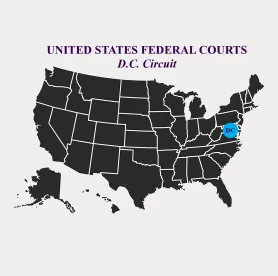On July 19, the United States Court of Appeals for the District of Columbia Circuit issued a ruling in Montgomery v. Internal Revenue Serv., a case concerning the Internal Revenue Service’s (IRS) handling of Freedom of Information Act (FOIA) requests for information about whistleblower disclosures. The Court upheld the right of the IRS to withhold any information that might reveal the existence of a whistleblower due to the role IRS whistleblowers play as confidential sources to help enforce tax laws. Additionally, the Court noted that whistleblowers can be subject to retaliation from “revenge-seeking” FOIA requesters who have been audited by the IRS.
In the early 2000s, husband and wife Thomas and Beth Montgomery allegedly undertook a fraudulent tax scheme using sham partnerships as tax shelters to artificially report business losses of over $1 billion on individual tax returns. The IRS eventually discovered the scheme, disallowed the reported losses in adjustments, and recovered back taxes from the couple.
Following a settlement which resolved the tax issues, the Montgomery’s sought to uncover how their alleged tax schemes were discovered by the IRS. They submitted to the IRS a series of FOIA requests aimed at uncovering a suspected whistleblower. Five of the FOIA requests submitted by the Montgomerys requested the IRS to produce whistleblower forms, such as award payments.
The IRS denied the five FOIA requests for whistleblower documents based on FOIA Exemption 7(D) which exempts the disclosure of records collected for law enforcement purposes which “could reasonably be expected to disclose the identity of a confidential source.”
The Montgomerys filed the FOIA suit in the United States District Court for the District of Columbia alleging that the IRS wrongfully withheld documents requested in their FOIA submissions. The IRS defended their denial by asserting a Glomar Response, a refusal to neither confirm nor deny the existence of any whistleblower related records that were requested by the couple. The IRS argued that a Glomar Response was appropriate for any document related to its whistleblower program because the confirmation of whistleblower documents in a case could lead a requester to discover the identity of a whistleblower.
The District Court granted the IRS summary judgment on the issue and the Montgomerys subsequently filed an appeal. The Court of Appeals undertook a de novo review of the IRS’s denial of the whistleblower-related FOIA requests.
According to the Court, the Montgomerys argued that FOIA Exemption 7(D), which served as the basis for the IRS’s Glomar Response, “protects only the identity of a whistleblower and the information furnished by a whistleblower, not the existence of a whistleblower.”
The Court disagreed. It noted that Exemption 7(D) gives the IRS the authority to withhold information that “could reasonably be expected to disclose the identity of a confidential source” (5 U.S.C. § 552(b)(7)(D)) and that, by rule, the IRS is required to “use its best efforts to protect the identity of whistleblowers,” (26 C.F.R. § 301.7623-1(e)).
“To this end, the IRS gives a Glomar Response to FOIA requests seeking documents pertaining to whistleblowers, refusing to either confirm or deny the existence of such records,” the Court stated. “This policy makes sense. If the IRS only asserts Glomar when whistleblower records exist, and gives a negative answer when no records exist, savvy requesters would both (1) recognize that a Glomar Response indicates the positive existence of whistleblower documents; and (2) may well be able to deduce the identity of a potential whistleblower himself, the very information the IRS is required to protect,” the Court held.
The Court upheld the right of IRS whistleblowers to be protected from FOIA disclosures as confidential sources, particularly “when the pool of potential whistleblowers is very small, leading a revenge-seeking requester to narrow down the informant with relative ease.”
“Far from violating FOIA’s statutory scheme, the IRS’s Glomar Response to FOIA requests for whistleblower documents aligns with the purpose of Exemption 7(D) and the duties of the IRS to protect whistleblower identities,” the Court further stated in its decision.
The IRS has a tax whistleblower law that permits a whistleblower to report to the IRS major tax fraud and obtain an award. If the case deals with an individual whose annual gross income is more than $200,000, or the proceeds in dispute exceed $2,000,000, the whistleblower is entitled to an award that is between 15 and 30% of any collected proceeds received by the government as a result of the original information filed by the whistleblower. While the Montgomery’s may have suspected there was a whistleblower that resulted in the IRS audit for tax fraud, the IRS has strict rules protecting whistleblowers’ confidentiality and the existence of a whistleblower as a confidential source is not disclosed by the IRS during the course of an audit.
While the DC Circuit’s decision in Montgomery v. IRS upholds protecting from public disclosure under FOIA any records that could reveal the identity of IRS whistleblowers as confidential sources, this decision has additional applications for protecting anonymous whistleblowers under other programs, such as the Dodd-Frank Act whistleblower award programs at the Securities and Exchange Commission (SEC) and the Commodity Futures Trading Commission (CFTC). Congress used the IRS whistleblower law as a model when enacting the Dodd-Frank Act that created both the SEC and CFTC whistleblower programs. Congress also noted the need to protect the identity of corporate whistleblowers when they included additional protections in the Dodd-Frank Act, such as an express FOIA exclusion and the right of SEC and CFTC whistleblowers to file anonymous whistleblower complaints.
As scrutiny of whistleblower award programs increases, whether by the news media, academics or corporate lobbying groups, it is important to keep in mind there exists a strong need to protect from disclosure any information about a whistleblower, or in some cases, whether there was a whistleblower at all. As the Court in Montgomery v. IRS recognized there are “revenge” seekers out there looking to use FOIA as a tool to discover any information they can to narrow down the list of suspects to determine who turned them in.
Whistleblower confidentiality and anonymity remains the best way to protect a whistleblower from retaliation and this decision allows the IRS to continue upholding whistleblower confidentiality in the face of FOIA requests that can be used to unmask the whistleblower.
Geoff Schweller also contributed to this article.




 />i
/>i

